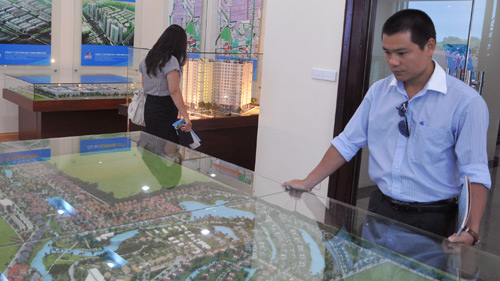Consumers likely to hold sway over housing market

Despite a sudden increase at the end of March and in April, house prices seemed to be declining slightly in May and June by VND3-5 million compared to the first quarter.
Stagnant transactions
Land prices in the northern part of Hanoi rose sharply by 20-30 per cent to VND32-35 million/square metre, especially when housing projects along National Highway No.32 were nearing completion in the second quarter.
In the meantime, house prices in the urban areas of the city followed a downward trend for the first time since the economic slowdown in 2009.
According to a recent survey conducted by CB Richard Ellis Vietnam (CBRE), about 70 per cent of housing projects had lowered their prices by 10-15 per cent, while 10 per cent of the projects were grinding to a halt in transactions.
CBRE reported that Hanoi had an abundant supply of 7,500 new apartments over the past three months, accounting for nearly 50 per cent of last year’s total figure.
Nguyen Bich Son, a senior analyst from CBRE, said that despite a decline in house prices in the second quarter of this year, the housing market was still in a fix.
Nguyen Tien Quoc, a senior market analyst from Colliers Vietnam, attributed this to a shortage of capital on account of tightening credit and weak growth of local stock exchange.
Flat prices have stayed almost the same or declined slightly by 1-2 per cent compared to the first quarter of this year, Bich Son said.
The sluggish market has forced investors to find ways of accelerating sales. Some big investors offer incentives for both potential customers and flat owners. Usilk City is willing to provide a 20-40sq.m floor space free for any customers who agree to buy flats and pay all at once.
Nguyen Tien Quoc said at present around 60-70 per cent of customers are investors. However, there have been real demands in recent years from a large number of young couples and people from other provinces who want their children to study and work in the city.
Prices keep declining
Marc Townsend, CBRE Vietnam general director said the housing market now depends on domestic investors, instead of foreigners as in the past. The market is within range of foreign investors but no longer their priority.
With a supply of around 11,000 new flats in 2011, investors and real customers will have a wide range of available choices. As it is still controlled mainly by investors, the housing market is very sensitive to short-term economic changes.
The supply of flats in the next few years will be mainly from the western part of the city. Cau Giay district will provide 17 per cent of the total high-end projects, including 1,008 flats at Mandarin Garden and 90 flats at Eurowindow Multicomplex in Tran Duy Hung street.
CBRE estimated that around 25-35 per cent of luxury flats are hired by foreigners.
“The number of Hanoi people who can buy many flats at the same time is small. As payment capacity is an important criterion, a slight decline in price will stimulate potential customers,” said Thu Thanh, a CBRE expert said.
CBRE forecast that around 5,000 flats will be offered for sale in the third quarter of this year so prices will be likely to fall. At present some investors have plans afoot to lower their exorbitant house prices.
What the stars mean:
★ Poor ★ ★ Promising ★★★ Good ★★★★ Very good ★★★★★ Exceptional
Related Contents
Latest News
More News
- Saigon Centre gains LEED platinum and gold certifications (February 12, 2026 | 16:37)
- Construction firms poised for growth on public investment and capital market support (February 11, 2026 | 11:38)
- Mitsubishi acquires Thuan An 1 residential development from PDR (February 09, 2026 | 08:00)
- Frasers Property and GELEX Infrastructure propose new joint venture (February 07, 2026 | 15:00)
- Sun Group led consortium selected as investor for new urban area (February 06, 2026 | 15:20)
- Vietnam breaks into Top 10 countries and regions for LEED outside the US (February 05, 2026 | 17:56)
- Fairmont opens first Vietnam property in Hanoi (February 04, 2026 | 16:09)
- Real estate investment trusts pivotal for long-term success (February 02, 2026 | 11:09)
- Dong Nai experiences shifting expectations and new industrial cycle (January 28, 2026 | 09:00)
- An Phat 5 Industrial Park targets ESG-driven investors in Hai Phong (January 26, 2026 | 08:30)

 Tag:
Tag:




















 Mobile Version
Mobile Version